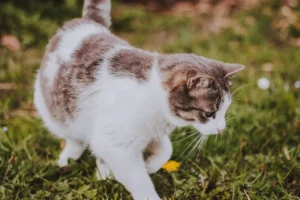Cats are known for their independent and curious nature, often doing as they please. One common behavior many cat owners have observed is their pets’ dislike for closed doors. But why is this the case?
Cats feel more secure in open spaces
Instinctual Behavior
Cats have a natural aversion to closed doors due to their instinctual behaviors. In the wild, closed spaces can signify danger or limited escape routes. Therefore, cats prefer to keep their surroundings open for quick exits in case of a threat. This behavior has been ingrained in their DNA over generations of evolution, making closed doors trigger their primal instincts for survival. Additionally, cats are territorial animals and may see closed doors as a barrier to their territory, leading to stress and anxiety.
Need for Exploration
Cats are notorious for their curiosity and need for exploration. They have a strong desire to roam and investigate their environment. Closed doors can be an obstacle to satisfying this curiosity, causing frustration and restlessness in cats. By nature, felines are intelligent creatures that thrive on mental stimulation and new experiences. Therefore, limiting their access to certain areas can dampen their spirits and lead to behavioral issues like meowing, scratching, or even aggression.
Additional Unique Insight:
One unique angle to consider is that closed doors can disrupt a cat’s daily routine and impact their sense of control over their environment. By restricting access to certain areas, owners may unintentionally disturb the balance in their cat’s daily life, leading to stress and discomfort. It’s essential to provide ample opportunities for your feline friend to explore and move freely to maintain their well-being and happiness.
Fear of Entrapment
Cats have an innate fear of being trapped, which can make closed doors particularly distressing for them. This fear likely stems from their instincts as hunters, needing to always have an escape route to remain safe in the wild. When a cat encounters a closed door, they may feel anxious about not being able to freely move around as they please. This fear of entrapment can lead to behaviors like scratching at the door, meowing incessantly, or even trying to forcefully push their way through. Providing your cat with ample opportunities to explore and move freely within their environment can help alleviate this fear and reduce their distress when faced with closed doors.
Separation Anxiety
Another reason why cats may dislike closed doors is the possibility of experiencing separation anxiety. Cats are known for forming strong bonds with their owners and may feel distressed when unable to access them. Closed doors can symbolize a barrier between the cat and their beloved human, causing feelings of loneliness and isolation. To help ease separation anxiety, it’s important to create a comforting environment for your cat with plenty of engaging toys, cozy resting spots, and familiar scents. Additionally, spending quality time with your cat and providing regular interactive play sessions can strengthen your bond and reassure them that you are still there, even if a closed door temporarily separates you.
Additional Insight: Creating a Cat-Friendly Environment
To further reduce your cat’s aversion to closed doors, consider creating a cat-friendly environment that allows them to explore and feel secure. This includes providing vertical spaces for climbing, cozy hideaways for privacy, and interactive toys for mental stimulation. By enriching your cat’s living space, you can help alleviate their anxiety and make them feel more at ease, even when faced with closed doors.
Territory Marking
Closed doors can disrupt a cat’s natural instinct to mark their territory, leading to discomfort. Cats are territorial animals, and they use scent to mark their space. When a door is closed, it prevents them from accessing or marking certain areas, causing stress and anxiety. To help your cat feel more at ease, consider leaving doors slightly ajar to allow them to roam freely and mark their territory effectively.
Noise Sensitivity
For some cats, noise sensitivity can play a significant role in their aversion to closed doors. Cats have highly sensitive hearing, and sudden loud noises or unfamiliar sounds can be very unsettling for them. When a door is closed, it can muffle or amplify sounds, creating an environment that is distressing for your feline friend. To help alleviate this issue, consider using soft closing mechanisms on doors or providing a safe and quiet space for your cat to retreat to when they feel overwhelmed by noise.
Additional Unique Insight: Cats may also feel isolated or cut off from their human companions when doors are closed. They are social animals and often like to be near their owners. Closed doors can act as a barrier, preventing cats from being close to their favorite humans. Consider leaving doors open to allow your cat to feel more connected and less isolated.
Solutions and Alternatives
If your cat has a strong aversion to closed doors, there are a few simple solutions to help ease their anxiety and make them feel more at ease. One effective strategy is to provide alternative routes or access points around your home. Consider installing a cat door or leaving certain doors slightly ajar to give your furry friend the freedom to move around without feeling trapped. Additionally, creating a comfortable and inviting environment in your home, complete with cozy beds, scratching posts, and interactive toys, can help alleviate any stress or frustration your cat may be experiencing. Remember, understanding your cat’s behavior and providing a safe and stimulating environment is key to keeping them happy and content.
- Install a cat door or leave doors slightly open for easy access
- Provide a stimulating environment with cozy beds, scratching posts, and toys
Remember, cats are independent creatures who value their freedom and space. By making a few simple adjustments, you can help your feline companion feel more comfortable and relaxed in your home.
Alex, a passionate animal lover, has experience in training and understanding animal behavior. As a proud pet parent to two dogs and three cats, he founded AnimalReport.net to share insights from animal experts and expand his knowledge of the animal kingdom.









